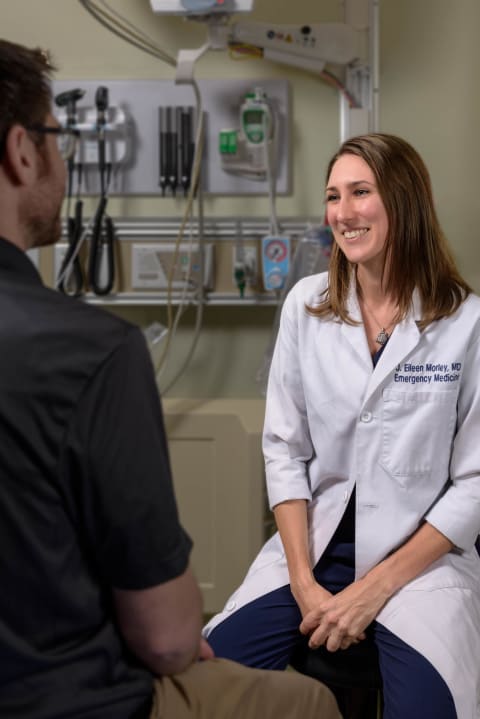
A Bridge to Hope
Story 121
The hardest part was feeling helpless.
Emergency room doctors and nurses are trained to act at a moment’s notice, riding on the adrenaline of life-or-death scenarios that come through the doors every day. In any given shift, they will restart hearts, clear airways, and bring patients back from the brink.
But for years, when those with substance use disorders came in withdrawing from drugs — nauseated, vomiting, violently ill, and seeking relief — there was little any emergency department caregiver could do about it.
Things are different now. A California state program piloted by Adventist Health and Rideout and 12 other Adventist Health locations has brought hope to those with substance use disorders and their clinicians, equipping emergency department (ED) associates with the necessary training to treat symptoms of opioid withdrawal and the dedicated staff to help transition them to treatment programs.
"Now, it feels good to be able to do my job.”

“Before, I felt like I was unable to do my job or actually help these patients in any meaningful way,” said Dr. J. Eileen Morley, Adventist Health and Rideout’s ED assistant medical director, who oversees the CA Bridge Substance Use Navigation program locally. “We just put a Band-Aid on their substance use disorder, and it felt terrible because I knew they were walking out the door to use heroin or fentanyl again. Now, it feels good to be able to do my job.”
The CA Bridge program was established statewide in 2020 as a means to reduce California’s staggering opioid overdose death rate. Just that year, 5,502 people died of an opioid overdose, and emergency departments saw more than 16,500 visits related to opioid overdoses, state data shows.
That’s where the program starts — in the safety net of the emergency department. When somebody comes to Adventist Health and Rideout in withdrawal, they can be treated with buprenorphine, a medication that eases violent symptoms and is often used as a daily treatment through rehabilitation. After symptoms subside, a substance use navigator comes in. At Adventist Health and Rideout, it’s Todd O’Berg, who has been working in the addiction treatment space locally for more than 20 years. He meets with patients one-on-one and guides them through outpatient treatment options available to them.
“The program is very important to the community, and we are making a difference in not only the patient’s life, but also in the life of their kids, grandkids, parents, and grandparents,” O’Berg said. “I believe when you treat a patient, you're also treating present and future generations in hopes of breaking cycles within the family.”
Beyond working with the patients, O’Berg works with associates to foster a culture of harm-reduction, increasing respect and decreasing stigma toward those with drug addictions.
“I talk to nursing classes a couple of times a year and emphasize the acceptable language to be used while working with a patient, as well as leaving any judgment they may have at the door when they arrive at work,” O’Berg said.
Before they leave the hospital, O’Berg sets up an appointment for each patient to begin treatment at a partnering clinic. They leave with a reminder card and prescription for buprenorphine to hold them over until their treatment begins. There’s no need for paperwork, phone calls, or dealing with insurance. The only thing they have to do is show up.
“I believe when you treat a patient, you're also treating present and future generations in hopes of breaking cycles within the family.”
In the early days of the program, this transition was not as simple. Adventist Health and Rideout was dealing with a problem that has plagued rural communities across the state for years: Access to medication-assisted treatment facilities — the gold standard for substance use disorder recovery — is limited.
In Sutter and Yuba counties, there were only two such facilities for many years. They were often overloaded with patients, offered limited hours for the dispensation of buprenorphine, and were out of geographic reach for many people. But Dr. Morley and O’Berg wouldn’t let that stand in their way. They worked with local health clinics outside of Adventist Health to get physicians X-waivered, a process that allows them to dispense daily buprenorphine for those in recovery. There are now as many as 10 clinics across Sutter and Yuba counties that dispense this medication.
“It really helps with the transportation [issue], since a lot of these folks don’t have a car or bike or any way to get there other than walking or a lift from a friend,” Dr. Morley said.
Since the program was first piloted in 2019, Adventist Health and Rideout has received an increasing number of people coming into the emergency department who are going through withdrawals.
“Word has gotten out that if you come here, we have an effective treatment and a non-judgmental community in the ER willing to give you a hand,” Dr. Morley said.
In this kind of work, the tough moments are sometimes offset by the rewarding moments, Dr. Morley said, like when patients who visited the hospital on the worst days of their life return with words of thanks.
“Seeing that transformation makes you see people who use drugs in a different light,” Dr. Morley said. “It is one of the most impressive and heartwarming things to see all the work the patient has done to get their life back on track and to know that we were a part of their journey. That’s the kind of care we want to give to all of our patients.”
Related stories

Todd Reese

Mark Mitchelson

Milad Pezeshki

Somos | "We Are"

Sarah Gutierrez

Cory Ferrier

Central Coast Service Area | Celebration Event

Mara Bryant

Camie Overton

Jayant Eldurkar

Terry Johnsson

Nursing Chose Me

Jayme Mason

Patrick Takahashi

Home again at Adventist Health White Memorial Montebello

Sarah Shelbourne

Jenny Lavers

Shane Cox

Kiyoshi Tomono
